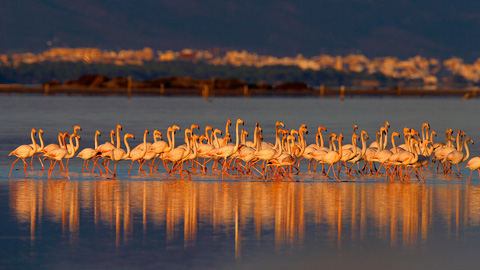The ICTA-UAB awarded an Erasmus+ for running a project on higher education and research in Biosphere Reserve

05/12/2018
The main objective of the project is to strengthen, ameliorate and upgrade the academic activity at four Moroccan and Lebanese Higher Education Institutions (HEIs) in the context of Mediterranean Biosphere Reserves (BRs), in collaboration and through networking with BRs’ stakeholders (citizens, visitors, managers and technicians), public administrations and EU Partners.
These four targeted academies are the Cadi Ayyad University (Marrakesh); the Mohammed V University (Rabat); the University Saint Joseph (Beirut) and the American University of Beirut. The objective will be pursued by a consortium of organizations made up by the French Aix Marseille University, the Rome-based Union for the Mediterranean University (UNIMED), the MAB France, and the Association for the Protection of Jabal Moussa BR. The project coordination is run by the “Conservation, Biodiversity and Global Change” research group at the ICTA, led by Dr. Martí Biada and coordinated by Dr. Roser Maneja. Mr. Antonio Bontempi will be the project manager.
“Biosphere Reserve” is a UNESCO label for territories composed by a mosaic of natural protected areas, cultural heritage sites, human settlement and small-scale, eco-friendly economic activities. The UNESCO defines BRs as ‘science for sustainability support sites’, ‘living laboratories’ for scientific research, monitoring, training, and education for UN’s Sustainable Development Goals (SDGs). Jabal Moussa (Lebanon), Shouf (Lebanon), Arganeraie (Morocco), Intercontinental BR of the Mediterranean (Spain-Morocco), Montseny (Spain) and Mount Ventoux (France) are the BRs involved in the project.
The project promoters consider that currently there is a disconnection between academic activity and the reality of Biosphere Reserves, poor collaboration within the scientific community and gaps in the legal framework and governance mechanisms for a sustainable territorial management. They state there is poor collaboration between Mediterranean Biosphere Reserves and that sharing experiences between territories is needed to solve this problem, as well as promoting a culture of socio-ecological sustainability. They believe the involvement of local communities is key to successful Biosphere Reserves.
The Edu-BioMed project aims to empower universities in order to overcome such problematics. Thus, the purpose is to foster transnational cooperation based on multilateral partnerships to support the modernisation, accessibility, quality and internalisation of Higher Educations Institutes in non-European partner countries with actions focused on improving the alignment of higher education with labour market and social needs, and improving the level of skills through new education programs. They propose other actions such as strengthening management, governance, innovation and internationalisations capacity, building the capacity of national authorities to modernise their own Higher Education Institutions, as well as fostering the regional integration and cooperation across different regions. Overall, the project is expected to involve more than 100 people from the participating Mediterranean countries.